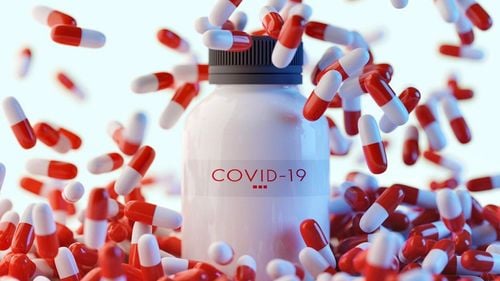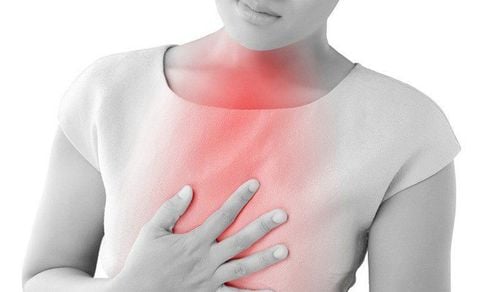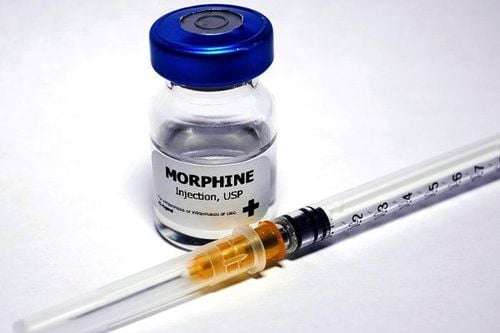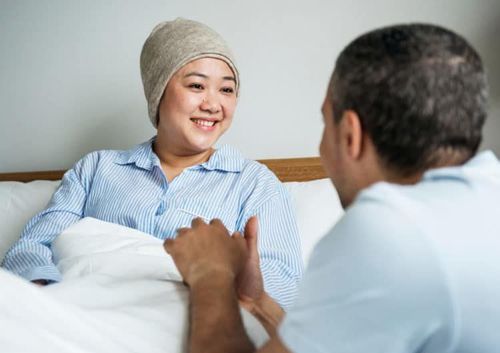This is an automatically translated article.
Post by Master, Doctor Doan Trung Hiep - Head of Radiation Therapy Department - Center for Oncology - Radiation Therapy - Vinmec Times City International HospitalThe Covid-19 pandemic caused by the SARS-CoV-2 virus continues to severely affect many people, including cancer patients, their families and carers. In this article, we'll discuss questions about the Covid-19 vaccine with people with cancer (or a history of cancer) and cancer caregivers.
Vaccines (also called immunizations or immunizations) are used to help a person's immune system recognize and protect against certain infections.
Many groups of medical experts recommend that most patients with cancer or a history of cancer get the Covid-19 vaccine. Because everyone's condition is different, it's best to consult with your doctor about the risks and benefits of the Covid-19 vaccine.
Learn more about Covid-19 and how it can affect cancer patients and their caregivers through the Covid-19 vaccine FAQs below:
Is it safe to give any vaccine to cancer patients?
People with cancer (or a history of cancer) can get some vaccines, but this depends on many factors, such as the type of vaccine, the type of cancer a person has had. , if they are still being treated for cancer and whether their immune system is working properly. Therefore, it's best to talk to your doctor before getting any vaccines.What Covid-19 vaccines are available?
There are currently 3 Covid-19 vaccines that have received an emergency use authorization (EUA) from the US Food and Drug Administration (FDA), which are:
Pfizer-BioNTech vaccine: This vaccine is approved for use in people 12 years of age and older. It is given in 2 doses, 3 weeks apart. Moderna vaccine: For use in people 18 years of age and older. It is given in 2 doses, 4 weeks apart. Johnson & Johnson (Janssen) vaccine: This vaccine is approved for use in people 18 years of age and older. It is given as a single injection. The Pfizer-BioNTech and Moderna vaccines contain messenger RNA (mRNA), which is a type of genetic material. After a person receives the vaccine, the mRNA enters the cells of the body and activates the cells to make copies of the protein that "stops" the Covid-19 virus (the protein that normally helps the virus infect other cells). human cells). Vaccination does not cause disease, but it does help the immune system to activate action against the virus if the body is exposed to the virus in the future.
Johnson & Johnson (Janssen) vaccine contains adenovirus (a virus different from the coronavirus that causes Covid-19), which has been altered in the laboratory so that it contains a gene (segment of DNA) that blocks the protein of the Covid-19 virus- 19. When the adenovirus enters cells in the body, the gene instructs the cells to make copies of the mutated protein. This triggers the immune system to recognize and attack the Covid-19 virus if the body is exposed to it in the future. The adenovirus in this vaccine is not a live virus because it has been altered so that it is no longer able to reproduce in the body (nor can it cause disease).
All three vaccines are claimed to significantly reduce the risk of contracting Covid-19 . They have also been shown to be very effective in reducing your risk of getting worse, being hospitalized, or dying from Covid-19 if you become infected.
Some vaccines for other diseases contain modified versions of the live virus that causes the disease. These live viruses do not cause problems in people with normal immune systems, but they may not be safe for people with weakened immune systems, so live virus vaccines are generally not recommended. for cancer patients. However, the Covid-19 vaccine currently available in the US does not contain these live viruses.
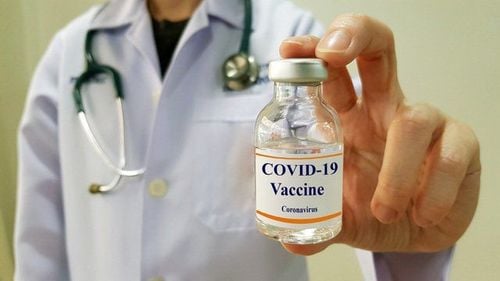
What is an emergency use authorization (EUA)?
In the EUA, the FDA authorizes the use of a vaccine or drug during an emergency, such as the current Covid-19 pandemic, when the available evidence suggests that the potential benefits outweigh the potential risks. The EUA is not the same as full FDA approval, which requires more scrutiny for safety and effectiveness.
The drugs and vaccines that have been given to the EUA continue to be studied in clinical trials. For example, it remains unclear whether someone who gets one of the vaccines can still infect others with the virus. This is still being studied as well as any possible long-term effects of the vaccine. Researchers are still trying to determine how long the vaccine will protect against the virus.
What are the side effects of the Covid-19 vaccine?
Common side effects that have been reported after vaccination include:
Pain, redness, or swelling at the injection site Feeling tired Headache Fever Chills Muscle and joint pain Nausea For vaccines requires two injections, side effects may be slightly stronger after the second injection than you may experience after the first injection. In general, side effects tend to go away within a few days of injection.
However, some people may experience other side effects after receiving the Covid -19 vaccine such as:
Swollen or tender lymph nodes:
Some people may have swollen or painful lower lymph nodes arm is injected. This is usually a normal response of the body's immune system, which is getting ready to fight a future Covid-19 virus infection.
A swollen underarm lymph node can be cause for concern, as it can also be a sign of breast cancer (as well as some other cancers). The time it takes for the lymph nodes to shrink after vaccination can be days to weeks, although this is still being studied. If you notice swollen or tender lymph nodes that don't go away after a few weeks (or if they continue to get bigger), contact your doctor to discuss next steps.
For people with any type of cancer or a history of cancer, many cancers can spread to nearby lymph nodes (and some cancers can start in the lymph nodes). blood). This can cause the lymph nodes to become enlarged. Because the Covid-19 vaccine can also cause lymph nodes to enlarge, it is important to tell your doctor if you are scheduled to have imaging tests (such as an MRI or CT scan) during these days. weeks after getting the Covid-19 vaccine. In some cases, your doctor may recommend delaying the imaging test if possible, so that any swollen lymph nodes caused by the vaccine are not mistaken for cancer. If you have the scan done right after your vaccination, it's important to make sure your doctor knows you've had the vaccine, so they can take this into account when reviewing the scan results.
Serious and long-term side effects of the Covid-19 vaccine:
So far, there are only a few possible serious safety concerns with the vaccine such as:
Allergic reactions to the vaccine -vaccinations In very rare cases, people have had serious allergic reactions after receiving one of the vaccines. This seems to be more likely in people who have had a severe allergic reaction before.
Blood clots Very rarely, people who have had the Johnson & Johnson (Janssen) vaccine develop serious blood clots in the brain, abdomen, legs, or other parts of the body along with platelet counts in low blood pressure (platelets are cells that normally help blood clot). Most of these outcomes occurred in women between the ages of 18 and 59 and 6 to 15 days after vaccination.
The FDA and the US Centers for Disease Control and Prevention (CDC) have reviewed the data on these incidents and determined that the known and potential benefits of the vaccine outweigh the risks. known and latent in persons 18 years of age and older.
FDA and CDC recommend that if you have had the Johnson & Johnson vaccine within the past 3 weeks, you should contact your healthcare provider immediately if you have possible symptoms presence of blood clots, such as severe or constant headache, blurred vision, seizures, abdominal pain, pain or swelling in the legs, chest pain, or difficulty walking. You should also contact your healthcare provider if you have symptoms related to a low platelet count, such as new or easy bruising; small purple, red spots on the skin that look like a rash.
All of these Covid-19 vaccines are still fairly new, so possible long-term side effects are still being studied and guidance on different vaccines may change . If you are concerned about getting vaccinated against Covid-19, it is important to talk to your doctor.
Is the Covid-19 vaccine available to people with cancer?
The US Centers for Disease Control and Prevention (CDC) recommends that anyone 12 years of age or older get the vaccine, so this includes people with cancer.
Should patients undergoing cancer treatment or a history of cancer get the Covid-19 vaccine?
Many groups of medical experts recommend that most people with cancer or a history of cancer get the Covid-19 vaccine.
The main concern about vaccination is not whether it is safe for people with cancer but about its effectiveness, especially in people with weakened immune systems. Certain cancer treatments such as chemotherapy, radiation therapy, stem cell or bone marrow transplants, or immunotherapy can affect the immune system, which can make vaccines less effective. than. People with certain types of cancer, like lymphoma or lymphoma may also have weakened immune systems, which can make vaccines less effective.
The initial studies testing a Covid-19 vaccine did not include people being treated with drugs that suppress the immune system, such as chemotherapy, or people with weakened immune systems for other reasons. This is because studies are needed to see if the vaccine works in people with healthy immune systems. Therefore, it remains unclear how effective the vaccine is for these groups of people.
Although there is no specific information about how effective the vaccine is for people being treated for cancer, the vaccine may not be as effective in people with weakened immune systems compared to others. people with a healthy immune system. Even so, experts still recommend that most cancer patients get the vaccine because those with weakened immune systems are at increased risk of severe Covid-19 illness, so even getting some Protection from a vaccine is still better than no protection at all.
Because everyone's condition is different, it's best to discuss the risks and benefits of getting one of the Covid-19 vaccines with your oncologist. They can advise and tell you when you should have an injection.
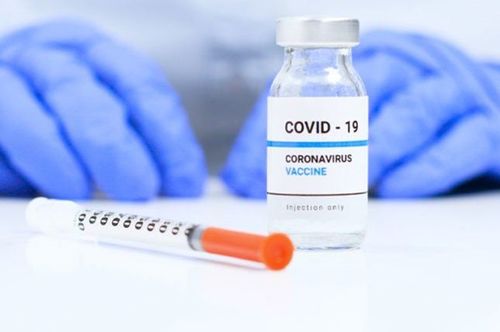
Should people with cancer get a special Covid-19 vaccine?
As mentioned, Pfizer-BioNTech and Moderna vaccines are mRNA vaccines, while Johnson & Johnson (Janssen) vaccines are adenovirus vaccines. The main difference between them at this point is that the mRNA vaccine is given as 2 shots (for 3 to 4 weeks), while the adenovirus vaccine is given as a single shot.
These vaccines have been studied in different places and at different times, but there have not been any studies that directly compare different vaccines. Therefore, it is not clear whether any vaccine is safer or more effective than any other, and whether any vaccine will be more (or less) effective for with some new variants of Covid-19 that have emerged in recent months. This is currently being studied as well as the possibility of needing additional injections in the future to help protect against these variants.
All 3 vaccines currently available have been shown to be effective in reducing your risk of contracting Covid-19 as well as the risk of severe illness if you become infected.
Do I need a backup if I have been vaccinated against Covid-19?
Covid-19 vaccines are still being worked on, as there are things we don't know about them yet. For example, researchers are still trying to determine how long a Covid-19 vaccine will help protect against the virus. While it is clear that vaccines can reduce the risk of serious illness from Covid, it is not yet clear how well they can prevent the spread of the virus to others.
Therefore, after fully vaccinated against Covid-19 vaccine, you still have to seriously take preventive measures such as hand sanitizer, distance, mask... to ensure your safety and your safety. those around.
Can I get the Covid-19 vaccine if I have breast cancer or a history of breast cancer?
Some people who get the Covid-19 vaccine may experience swollen lymph nodes under their arm when they get the shot. Because swollen lymph nodes under the arm can also be a sign of breast cancer spread, most doctors recommend that people with breast cancer or a history of breast cancer get injections into the opposite arm. breast cancer incidence. For example, if your breast cancer/breast surgery is in your left breast, it's probably best to get the injection in your right arm. If you've had surgery on both breasts, talk to your doctor about the best place on your body for the injection.
Swollen lymph nodes after vaccination can also affect your mammogram results.
Can the Covid-19 vaccine cause problems if I go in for a mammogram?
Getting the Covid-19 vaccine can lead to swollen lymph nodes under the arm where the injection was given. Swollen lymph nodes under the arm may show up on mammograms done to screen for breast cancer, which can be cause for concern and lead to the need for other tests.
If you are scheduled to have a mammogram shortly after receiving the Covid-19 vaccine, it is important to let your doctor know when and where you received the shot. Based on your situation, they can discuss whether you should change your mammogram appointment. Do not arbitrarily delay your mammogram without first talking to your doctor.
Can cancer caregivers get the Covid-19 vaccine?
Some vaccines for other diseases contain altered variants of the live virus that causes the disease. These live virus vaccines are generally not recommended for cancer caregivers because they may have undesirable effects on cancer patients. However, currently available Covid-19 vaccines do not contain these live viruses, so getting one of these vaccines does not put you at risk of transmitting the Covid-19 vaccine to someone you are receiving. take care of.
People who get vaccinated may not feel well for several days after each shot, so someone else is available to assist with care during this time or to seek medical attention if you experience side effects undesired seriousness.
Where can I see more information about the Covid-19 vaccine?
CDC and FDA have a lot of information about Covid-19 vaccines, including the different vaccines and the possible risks and benefits of each.
Therefore, you can find out more information about the Covid-19 vaccine at the website of the US Centers for Disease Control and Prevention (CDC) and the US Food and Drug Administration (FDA).
In summary, the majority of health professionals recommend that most patients with cancer or a history of cancer get the Covid-19 vaccine. However, because everyone's condition is different, it's important for people with cancer and caregivers to consult with their doctors about the risks and benefits of the Covid-19 vaccine. .
Please dial HOTLINE for more information or register for an appointment HERE. Download MyVinmec app to make appointments faster and to manage your bookings easily.





